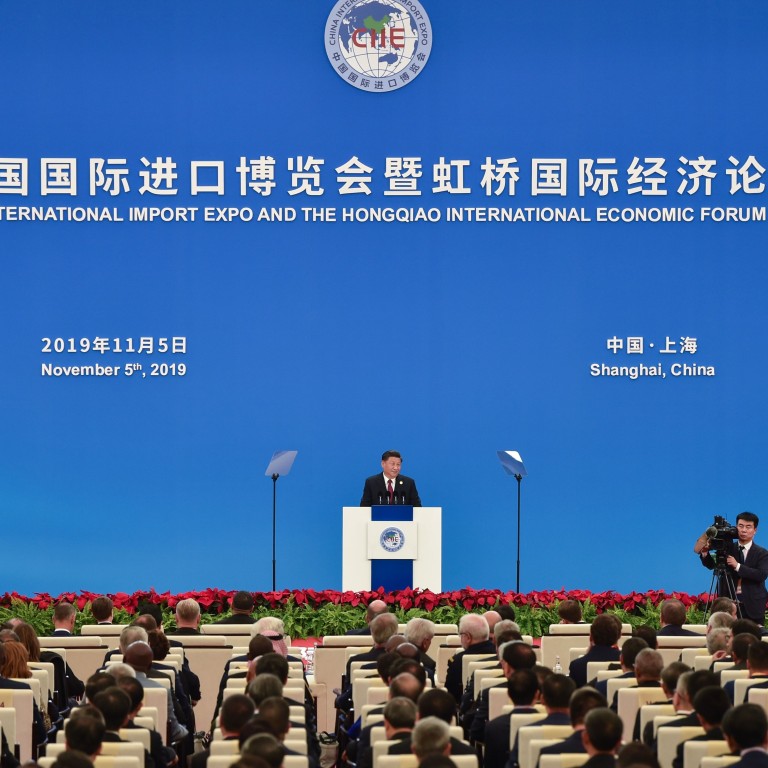
China will open market further in push to bring down global trade barriers, Xi Jinping tells import expo
- China’s president has urged global leaders to bring down trade barriers and resist protectionism in a speech at the China International Import Expo
- Xi’s comments come a day after the closing of the Canton Export Fair, at which export orders fell for the third year in a row amid the US trade war
President Xi Jinping pledged on Tuesday that a more robust domestic market and a modern government would stimulate China’s opening up to the rest of the world, again portraying the nation as a leader in advancing globalisation and combating protectionism.
Xi emphasised that global economic integration was a long-term historical trend – comparing it to some of the world’s longest rivers – that could not be halted, adding no country alone could solve challenges this process posed for the world’s economic development.
He called on global leaders, including French President Emmanuel Macron who was at the event, to work together to expand the global market and reduce resistance to globalisation.
All countries should adhere to the concept of people first, and we should not put our own interests above human interests
The global economy was becoming increasingly integrated and a few “bumps” in the globalisation process were inevitable, Xi said, speaking at the expo for the second year in a row. Consultation and cooperation, not protectionism, were the correct way to address these challenges, he repeated.
“As long as we treat each other as equals, understand and accommodate each others’ interests, there is no problem that cannot be solved,” Xi said.
“We should pursue ‘tearing down walls’ instead of ‘putting up walls’, resolutely opposing protectionism, unilateralism, continuously reduce trade barriers, improving global value chains and supply chains and jointly cultivating market demand.”
As part of efforts to open its economy further, China would improve the fundamental role of consumption in the world’s second largest economy and build a more dynamic domestic market, while continuing to lower tariffs and systemic barriers to promote bilateral trade and investment, the president pledged.
Xi sent a particular message to the province of Hainan to speed up the creation of China’s largest free-trade zone. Beijing announced last April that Hainan, China’s entire southernmost island, would become a free trade port but progress has been slow so far.
To improve the environment for foreign businesses in China, Xi said the government would continue to reduce the number of areas in which investment is restricted or prohibited, improve information disclosure and strengthen the enforcement of intellectual property rights in civil and criminal courts.
China would support “necessary reform” of the World Trade Organisation, push forward negotiations on a bilateral China-European Union investment treaty and pursue a free-trade agreement with Japan and South Korea, he said.
Xi expressed satisfaction that 15 Asia-Pacific nations had finished negotiations on the Regional Comprehensive Economic Partnership trade deal and hoped it could be signed as soon as possible. He did not mention the fact that India had decided at the last minute not to sign the deal because its concerns were not adequately addressed in the negotiations.
Xi also noted progress in the Belt and Road Initiative, the country’s top international policy strategy to build infrastructure connecting China with the Middle East, Africa and Europe. China will continue to pursue “high-quality development” in belt and road projects, having so far signed 197 agreements with 137 countries and 30 international organisations, Xi said.
Underlining China’s commitment to opening up its economy, Xi said Shanghai had completed all three tasks concerning market liberalisation he had assigned at this time last year.
Among the 98 bilateral deals signed during the last Import Expo, 23 had been completed and the rest were being followed up, he added.
In a long speech after Xi, Macron said he hoped China would further open up its agricultural sector as farm goods were a top export from France to China. He also urged China to increase transparency on the process of giving access to foreign companies, in particular equal treatment on financing and winning government contracts.
Macron said China and Europe have many fields for collaboration, including climate change and protection of biodiversity, but “a trust-based transparent framework” was needed to avoid damage to each other’s national security.
The survey found that 47 per cent of deals reached by European businesses at last year’s Import Expo had not been realised.

